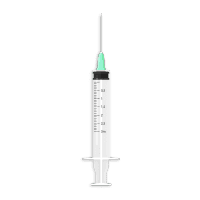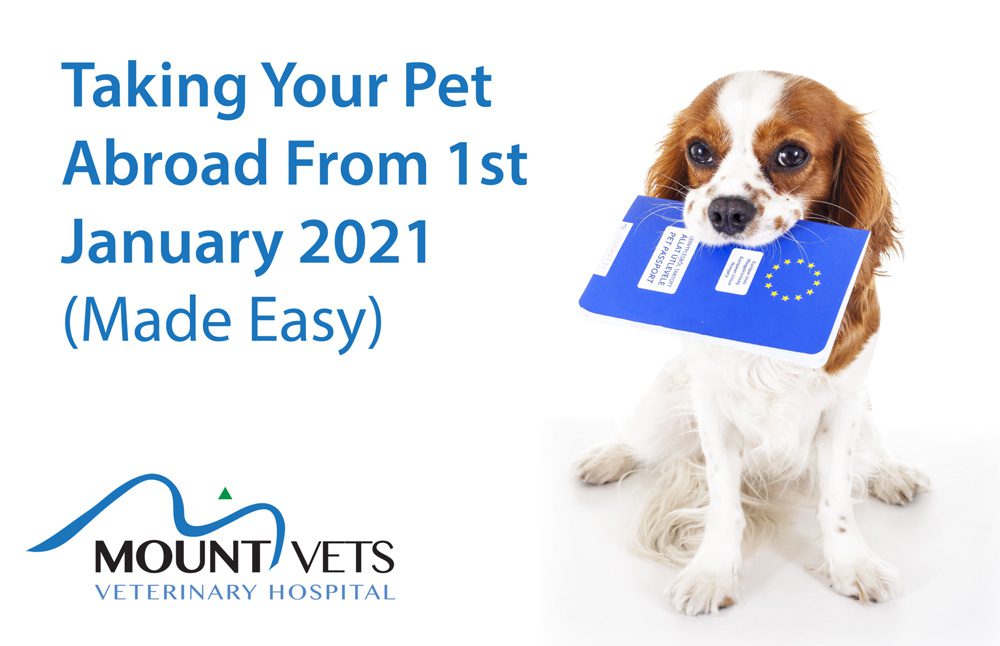When considering any pet travel please check the gov.uk website for the most up to date information contact APHA to discuss any specific questions you have.
Correct as of 31st March 2021. Please note: this guidance is aimed at the non-commercial movement of UK pets (dogs, cats and ferrets) travelling from Great Britain as a Part 2 listed country. There’s different guidance if you’re bringing your pet dog, cat or ferret to the UK. Read the Border Operating Model if you want to export pets to an EU country or Northern Ireland for commercial reasons such as a change of ownership.
Planning on travelling to the EU with your pet from 2021?
What does this mean for you?
- Unless you’re a UK national living in the EU, your EU pet passports are no longer valid (when leaving Great Britain) from 1st January 2021. Instead, you will need an Animal Health Certificate (AHC).
- When travelling to the EU or Northern Ireland, your pet (including assistance dogs) needs:

A Microchip

A valid rabies vaccination

An animal health certificate (unless you have a pet passport issued in an EU country).

Tapeworm treatment for dogs (if you’re travelling directly to Finland, Ireland, Northern Ireland, Norway or Malta).
Main points to remember about getting an AHC
- The earliest date we can complete an AHC is on the 22nd calendar day post rabies vaccination.
- The AHC is a 10-page document which will take a minimum of an hour to complete therefore we advised not booking to travel on the same day as the appointment.
- The AHC cannot be completed any earlier than 10 days before travel.
- To be able to book in for an AHC we need you to complete the below form.
- Up to 5 pets will be able to travel on a single AHC.
- A new AHC will be required for each journey to/from UK (you will be able to travel for 4 months around Europe providing the rabies vaccination does not expire during that time).
- If travelling directly to Finland, Ireland, Malta, Northern Ireland or Norway the tapeworm treatment will need to be given no less than 24 hours and no more than 120 hours (5 days) before you arrive.
- If planning a day trip only the tapeworm treatment will need to be given and recorded prior to travel as you will be unable to re-enter the UK until 24hours post tapeworm treatment.
- The person who is travelling with the pet must be at the AHC appointment as there is a section that must be signed by both the OV and the person travelling.
- If the owner is not travelling with the dog, we need a signed document from the owner specifying the name of the person who is travelling with the pet.
- An AHC cannot be used if the pet is being sold.
Please note that some countries have additional restrictions and requirements to travel to them. To keep you from scrolling through reams of information, we have provided guidance for the most common circumstances in easy-click tabs below. If your circumstances are not listed below, please give us a call and we will advise you as best we can, given the current information provided by the UK government.
Need to make an appointment?
You can still use a pet passport issued in a (current) EU country.
If you have a pet passport issued in Northern Ireland, contact your vet for advice before travelling. You can also read about changes to pet travel on the NIDirect website
Your pet will need a new animal health certificate for each trip to an EU country or Northern Ireland.
You will need to bring your pet to us within 10 days of your travel date to get an animal health certificate. There should be no problems issuing you with one, as long as your pet is microchipped and vaccinations up to date.
Your pet’s animal health certificate will be valid after the date of issue for:
- 10 days for entry into the EU or Northern Ireland
- 4 months for onward travel within the EU
- 4 months for re-entry to Great Britain
Your dog will need tapeworm treatment for each trip if you’re travelling directly to Finland, Ireland, Malta, Northern Ireland or Norway.
Rabies vaccination, boosters and blood tests
You must get your dog, cat or ferret vaccinated against rabies before it can travel. Your vet needs proof that your pet’s at least 12 weeks old before vaccinating them.
If you’re taking your pet to the EU or Northern Ireland, you must wait 21 days after the primary vaccination before you travel.
You must get your pet microchipped before, or at the same time as, their rabies vaccination. If you do not, they’ll need to be vaccinated again.
The vaccine must be an inactivated vaccine or recombinant vaccine that’s approved in the country of use.
Booster vaccinations
If you’re travelling with your pet, you must get regular rabies booster vaccinations for your pet. Check your animal health certificate to find out when the booster vaccination is due.
You will not need to get repeat vaccinations for repeat trips to the EU or Northern Ireland if your pet’s rabies vaccination is up to date.
Rabies vaccination record
Your pet’s rabies vaccination record in their animal health certificate must show:
- your pet’s date of birth
- microchip number, date it was put in or read, and where it is on your pet’s body
- rabies vaccination date
- rabies vaccine manufacturer, product name & batch number
- date the rabies vaccination is valid until
- the vet’s signature and contact details
Your pet can be stopped from travelling if the details in their animal health certificate are in the wrong place.
Tapeworm treatment for dogs
A vet must treat your dog for tapeworm and record it in the AHC if you’re travelling directly to:
- Finland
- Ireland
- Malta
- Northern Ireland
- Norway
The treatment must have been given no less than 24 hours and no more than 120 hours (5 days) before you arrive.
The treatment must:
- be approved for use in the country it’s being given in
- contain praziquantel or an equivalent proven to be effective against the Echinococcus multilocularis tapeworm
Short trips
If you’re leaving Great Britain (England, Wales and Scotland) for a short trip to visit countries other than Finland, Ireland, Malta, Northern Ireland or Norway, you could have your dog treated by a vet before you go.
You must wait for 24 hours before re-entering Great Britain and return within 120 hours or you’ll need to get another treatment abroad.
Information your vet needs to record
Check the vet has put the following details in the ‘Echinococcus treatment’ section of your dog’s pet animal health certificate:
- the name and manufacturer of the product
- the date and time they treated your dog
- their stamp and signature
You cannot take more than 5 pets to an EU country or Northern Ireland unless you’re attending or training for:
- a competition
- a show
- a sporting event
You’ll need written evidence of registration for the event when you travel.
All your pets must:
- be attending the event or training
- be over 6 months old
- meet all the other requirements for pet travel to that country
Arriving in an EU country or Northern Ireland
You’ll need to go through a travellers’ point of entry when you arrive in an EU country or Northern Ireland.
You may need to show your pet’s animal health certificate along with proof of their:
- microchip
- rabies vaccination
- tapeworm treatment (if required)
Help and support
You can contact the Animal and Plant Health Agency (APHA) if you’ve got questions or need more information. Alternatively, contact the Pet Travel Scheme helpline if you need more information about pet travel.
Pet Travel Scheme helpline
pettravel@apha.gov.uk
Telephone: 0370 241 1710
Monday to Friday, 8.30am to 5pm (closed on bank holidays)
Find out about call charges
If you’re travelling to a non-EU country, you’ll first need to complete an export health certificate (EHC), which then needs to be approved by the Animal and Plant Health Agency (APHA), and finally forwarded on to your vet. You’ll also need to complete an export application form (EXA) if you’re in England, Scotland or Wales.
The export health certificate and the export application form for each country and pet will tell you how to apply.
An EHC checks that your pet meets the health requirements of the country you’re travelling to.
You must nominate an official vet who will be sent the EHC. They’ll check your pet has met the correct health and identification requirements before you travel.
Check the rules of the country you’re travelling to for any additional restrictions or requirements before you travel.
Help and support
You can contact the Animal and Plant Health Agency (APHA) if you’ve got questions or need more information.
Animal and Plant Health Agency
exports@apha.gov.uk
Telephone: 03000 200 301
Monday to Friday, 8.30am to 5pm
Find out about call charges
Need to make an appointment?
If you live in Great Britain, your EU pet passport is no longer valid (when leaving Great Britain). An AHC is a document that needs to accompany your pet when travelling without a valid pet passport.
Your pet’s AHC will be valid for:
- 10 days after the date of issue for entry into the EU
- onward travel within the EU for 4 months after the date of issue
- re-entry to Great Britain for 4 months after the date of issue
Your pet will need a new AHC for each trip to an EU country or Northern Ireland.
Your pet will not need a repeat rabies vaccination so long as its rabies vaccinations are up to date.
Your dog will need tapeworm treatment for each trip if you’re travelling directly to Finland, Ireland, Malta, Northern Ireland or Norway.
The rabies vaccination is required every 3 years under EU law but is recommended annually.
Pets must be 12 weeks old to have the rabies vaccine and you must then wait 21 days before travelling to allow the vaccine to work correctly. This means your pet will be 15 weeks old before it can travel.
Owners of assistance dogs returning from the EU do not have to travel on approved routes but they must notify the point of entry in advance that they are travelling with an assistance dog to ensure the appropriate checks are done.
Click here to view the approved routes on the government’s website.
Click here to view the approved routes on the government’s website.
You must get your pet microchipped before, or at the same time as, their rabies vaccination. If you do not, they’ll need to be vaccinated again.
Microchipping for pet travel can only be done by:
- a vet
- a vet nurse, student vet or student vet nurse (directed by a vet)
- someone trained in microchipping before 29 December 2014, and with practical experience
- someone who has been assessed on an approved training course - contact the Department of Agriculture, Environment and Rural Affairs (DAERA) if the course was in Northern Ireland
Make sure your vet puts the microchip number in your animal health certificate. The date must be before your pet’s vaccinations.
Airlines, train and ferry companies in the EU can read microchips that meet International Organization for Standardization (ISO) standards ISO 11784 and ISO 11785.
You may have to bring your own microchip reader when you travel if your pet’s microchip does not meet ISO standards. You should check with your travel company before you leave.
If the microchip cannot be read
You’ll have to do all the preparation again if your vet cannot read the microchip. This means you’ll have to ask your vet to:
- rechip your pet
- revaccinate your pet
- issue a new animal health certificate if you’re travelling to the EU or Northern Ireland
- record new microchips in the ‘Marking of animals’ section of the new animal health certificate
You’ll have to wait the required time before you can travel if your pet is revaccinated or has new blood tests.
If the microchip can only sometimes be read
Your vet should try to read the microchip. If they get a reading, they can rechip your pet (the original chip is not removed).
This must be recorded in the animal health certificate in the ‘Marking of animals’ section with:
- the number of the old and new chips
- the date they were read
- the date the new chip was inserted
The vet must sign and stamp the page in the animal health certificate.
Your vet should record in the ‘Others’ section of the animal health certificate that your pet has been rechipped.
You do not need to have your pet microchipped if it’s been tattooed with an identification number and all of the following are true:
- you’re travelling to the EU or Northern Ireland
- your pet was tattooed on or before 3 July 2011
- the tattoo is clearly legible
- your pet was vaccinated against rabies after it was tattooed
Your vet must record the date of tattooing, the tattoo number and the date of the rabies vaccination in the animal health certificate.


